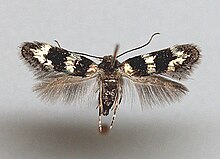Elachista gleichenella is a moth of the family Elachistidae found in most of Europe.
| Elachista gleichenella | |
|---|---|

| |
| Female | |

| |
| Male | |
| Scientific classification | |
| Domain: | Eukaryota |
| Kingdom: | Animalia |
| Phylum: | Arthropoda |
| Class: | Insecta |
| Order: | Lepidoptera |
| Family: | Elachistidae |
| Genus: | Elachista |
| Species: | E. gleichenella
|
| Binomial name | |
| Elachista gleichenella | |
| Synonyms | |
|
List
| |
Description
editThe wingspan is 8–9 mm (0.31–0.35 in).The head is bronzy -metallic.Forewings are dark bronzy -fuscous ; a small basal spot, a fascia before middle, and an outwards -angulated fascia towards apex pale golden-metallic. Hindwings are grey.The Larva is whitish, faintly purple-tinged ; head dark brown ; 2 with two purple-blackish marks.[2]
Biology
editThe larvae feed on Carex curvula, Carex digitata, Carex divulsa, star sedge (Carex echinata), glaucous sedge (Carex flacca), dwarf sedge (Carex humilis), smooth-stalked sedge (Carex laevigata), soft-leaved sedge (Carex montana), Carex morrowii, Carex muricata, Carex ornithopoda, false fox-sedge (Carex otrubae), greater tussock-sedge (Carex paniculata), pendulous sedge (Carex pendula), Carex pilosa, Carex sempervirens, wood sedge {Carex sylvatica}, Carex umbrosa, tufted hairgrass (Deschampsia cespitosa), white wood-rush (Luzula luzuloides), hairy wood-rush (Luzula pilosa), Luzula plumose and greater wood-rush (Luzula sylvatica).[3]
Distribution
editThe moth is found in most of Europe (except the Iberian Peninsula), east into northern Russia.[4]
References
edit- ^ "Elachista (Elachista) gleichenella (Fabricius, 1781)". Fauna Europaea. Retrieved 9 March 2020.
- ^ Meyrick, E., 1895 A Handbook of British Lepidoptera MacMillan, London pdf This article incorporates text from this source, which is in the public domain. Keys and description
- ^ "Elachista gleichenella (Fabricius, 1781)". Bladmineerders.nl. Archived from the original on July 23, 2011. Retrieved March 7, 2010.
- ^ Ellis, W N. "Elachista gleichenella (Fabricius, 1781) twin-barred dwarf". Plant Parasites of Europe. Retrieved 9 March 2020.
External links
edit